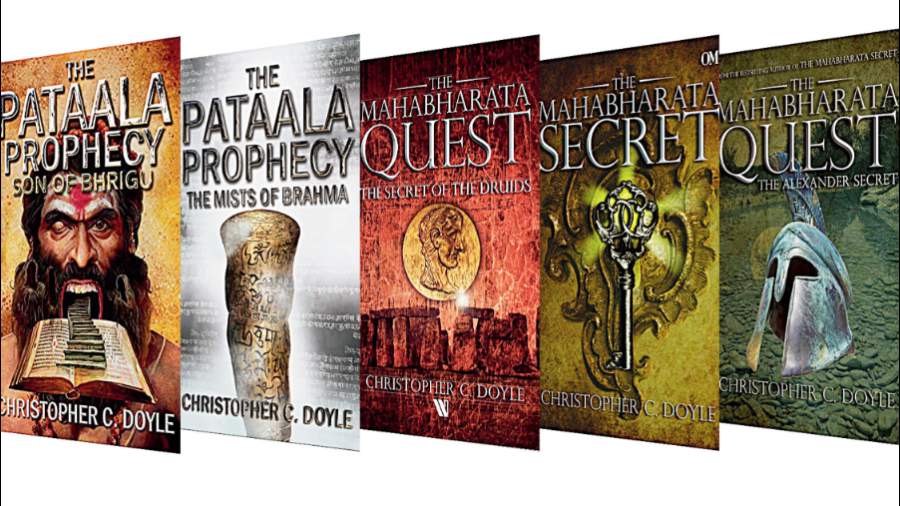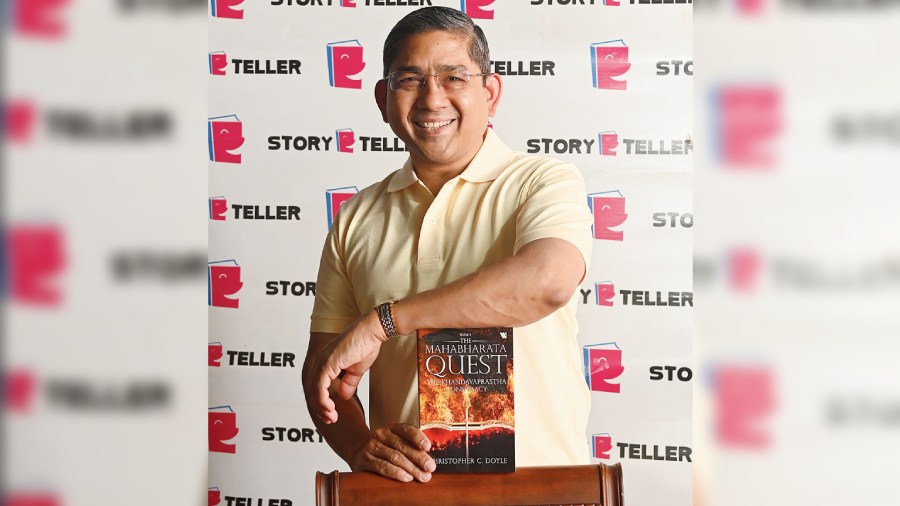At the Storyteller bookstore, off VIP Bazaar, for our scheduled meeting, we noticed Christopher C. Doyle doing a last-minute setting of his PPT for his fans who were to gather for a book-signing session over a bonfire, an hour later. His simplicity is evident from his no-fuss lemon yellow T-shirt, coiffured hair and humble demeanour. Often smiling, the alumni of IIM Kolkata, who is in the board of IIM Calcutta Innovation Park, was here on the last Sunday of November, a day before the official launch of the third book in The Mahabharata Quest series — The Khandavaprastha Conspiracy — to connect with his fans. He is not a full-time author but already has six books — The Mahabharata Secret, The Mahabharata Quest series (three books) and The Pataala Prophecy series (two books) — to his name. And the kind of research and scientific backing the mythology-fiction-thrillers have had, has been incredible, often blurring the lines between fiction and non-fiction, and that’s what marks him from his contemporaries who dwell on the same subject. A hearty chat gave us an insight into the Goa-based author’s genre-bending approach, busting the myth of the Khandavaprastha Conspiracy and more. Excerpts:
The book’s blurb starts with ‘In 3340 BCE, a deadly scourge ravages a village in China, forcing a handful of survivors to abandon their homes’. And then cut to present, ‘A devastating and terrifying disease is spreading fast across the globe, leaving scientists helpless and baffled’. This has so much similarity with the Covid-19 outbreak…
The story goes beyond the pandemic and is not related to it at all. Unlike the pandemic where we were able to identify the virus quite fast, name it and invent a vaccine, in the case of the book the pathogen is not known, cannot be detected by a test, hence deadly, and the human immune system cannot recognise it, hence no vaccine either. The idea came to me while I was working on Secret of the Druids in 2014-15 and I intended to develop this idea in a book later as I wasn’t ready for it at that time. It took me time. The connection to The Mahabharata is fiction but the science is real. I was supposed to travel for two weeks to an international destination for the last leg of the ground research when the world came to a halt. I lost a lot of money because I had paid archaeologists and others for the research work. So, I thought of using the materials with me and developing it in a different book. So, it sounds like the pandemic but the idea came much before that.
So in 2015 you had already decided about the third book in The Mahabharata Quest series?
I always think ahead. I have some more ideas and there should be at least two more books in the series. I will be completing the trip that got cancelled before the pandemic and it will help me in the subsequent volumes.
How long did the book take to materialise?
Technically speaking, it’s been in the making since 2015. So, seven years in total. But if you actually look at it then 2015 and 2016 I researched, and then took a break and picked up again in 2020. The writing doesn’t take time, it’s the research. I must be very smart and articulate with science, because the readers are smarter. For this book I will be putting out 300 relevant references in The Quest Club.
Your genre-bending approach that takes in a mythological element, invents a fictitious plot and then backs it up with scientific research is quite unique. Tell us about that.
No one else uses real science, a lot of people use science fiction, though. It is very deliberate because I wanted to differentiate myself. When I started working on The Mahabharata Quest the whole concept was to explore the epic using science. For example, if I say the Brahmastra is a nuclear weapon but if I don’t explain how and what is the engineering behind it and what are the shlokas in The Mahabharata that demonstrate it as a nuclear weapon then what’s the difference between me and any other author who uses his imagination. So that’s when I decided that if I want my story to be credible then I need to give a scientific explanation. For me the objective is when a reader reads, he/she should be left wondering if it’s real. And the only way I could do it is by using real science. And then there are so many dots to connect.
So I have doctors, engineers, biotechnologists who I approach for my research. For example, for The Mahabharata Quest: The Alexander Secret, I consulted the regional director for WHO Southeast Asia, Dr Rajesh Bhatia. Again, for Secret of the Druids, in the same series, I consulted a senior theoretical physicist based in the US.

The mythological element in the book is the Khandavaprastha Conspiracy. Tell us about that.
Dhritarastra divided the kingdom into two halves and gave one half to Duryodhana and the other to the Pandavas. The Pandavas went to Khandavaprastha. Now the interesting thing is a lot of people think that the Khandavaprastha is a dreadful forest where the evil spirits lived and the general belief is that the Pandavas burned the forest and built Indraprastha over its ruins. That’s not correct and I have explained it in the book in detail how the place was a prosperous district and the Pandavas ruled there annexing other kingdoms and the forest was burned down not by them but Agni after the battle between Arjun and Krishna on one side and the Devas on the other. I have elaborately explained how the incident is written in The Mahabharata and I have linked that with the science and a bit of history and Kolkata features in it.
Ah! That’s interesting! Would you like to share with us something about the Kolkata connection?
No, no. I want to keep it as a surprise for the readers here.
Mythology and thriller is a potent combination. What is it that drew you to the genres?
There are a couple of things: one is, even before I started writing, I found a fair amount of research and non-fiction books written by Western authors explaining different types of Western mythology and some of it had scientific, archaeological and historical evidence; all non-fiction books. I couldn’t find anything like that with Indian mythology. I also realised that in India it’s very hard to find evidence. Hence, it was difficult to write non-fiction and I opted for fiction and thriller format. But I hope I can write one, one day. The trigger really came when I started writing a story for my daughter who was seven years old at that time. She was also interested in mythology and history so I was like let me test my captive audience. (Laughs)
Does she still read your books?
Yes, very much.
You are an IIM Kolkata alumni and have had a flourishing career in management. What made you switch gears and opt for writing?
I have always wanted to be a writer, maybe since I was 10-years-old. I haven’t given up my work, I run my own business and that gives me flexibility. Writing took a back seat with the corporate job but now I can decide when I want to travel, write and work. Also, very interestingly, the writing scene has changed drastically in India and has become more author-friendly in the last 10-15 years. It’s not easy to juggle but I try and prioritise.
This question is from one of your social media posts where you asked your fans, ‘If one of my books is to be adapted for the screen, which one should that be and which actor/actress should be cast?’ We want to ask you the same question.
It’s a difficult question because I don’t watch too many web series. I prefer reading and have never been a major TV or movie addict. If there are interesting things that I am searching for then I watch YouTube or the OTT. However, I would like all my books to be adapted and there have been interests but I haven’t got a right production house for it.
How have you grown up as an author since 2015?
I think I have become a better writer in the sense of writing a much tighter book. Now when I go back to my older books, I think of making them better. Also, I have become more particular about my scientific research and I am going much deeper, making better connections and I am also writing more complex stories. My editor, in fact, also told me that this is my most complex plot.
What is it that you do as a hobby, to de-stress?
I have little time now, but when I was in Delhi I had a band called Midlife Crisis. We were all professionals, working with top companies and we would meet once a week and do five-six shows in a year. Like Usha Uthup’s music… some places in Delhi still prefer the kind of music we play and that is Western rock.
What’s next from your table?
I hope to start work on book three of The Pataal Prophecy series because that’s long awaited. I am hoping that I can release it next year. Plus, I did an audiobook — The Magadh Mystery — for Audible and I would like to explore that platform more. Also, last January I made a new addition to my Quest Club with The Quest Club Gold, a paid entity, which will have an explanation of The Mahabharata where I bring stories from the Puranas, Vedas and others and explain things. So, I am going to be very active there.
